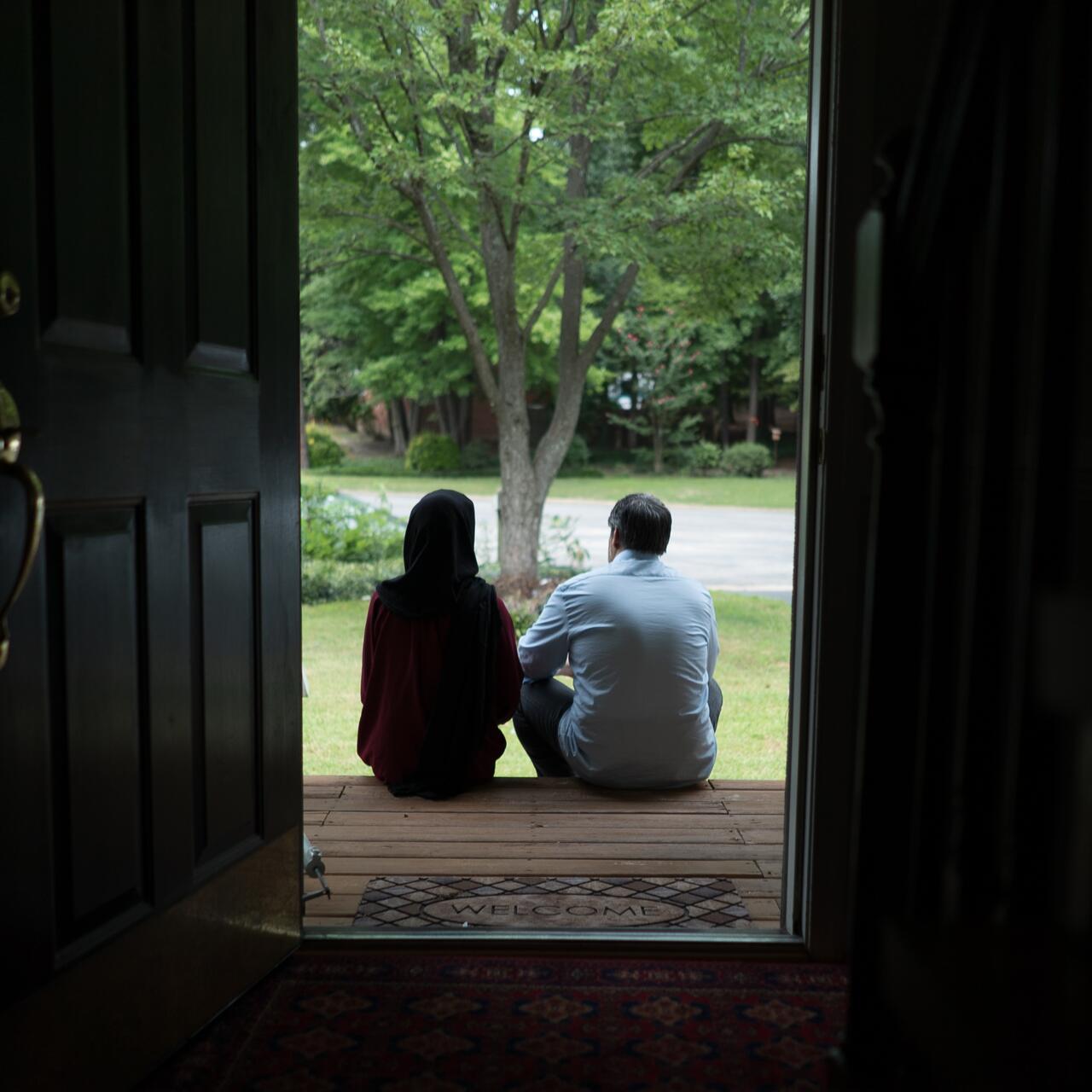
Afghans continue to arrive in the United States, where they seek safety and stability for themselves and their families. They often arrive with few possessions and have to leave behind friends and family who may still be in danger.
The International Rescue Committee (IRC) has been assisting Afghans through their resettlement journeys, delivering the critical information, health services and resources they need to build their new lives.
Below, in their own words, Afghan families* resetting in Richmond, VA share their experiences of leaving their home country and starting over in the U.S.
Abdul, 52
We are a family of five—my wife, my daughter, my two sons and me. My two sons were left behind in Afghanistan. When I was submitting my application, they were under 21 years of age. Because my case was delayed, now they are 23 years and 21 years old [and no longer eligible to resettle with us].
Leaving behind your birthplace where you have spent 50 years of your life is difficult and heart-breaking. You are going to a place where you do not know about your future except you have to work hard and struggle for your life.
Leaving behind your birthplace ... is difficult and heart-breaking.
In the U.S., I found my colleague who used to work with me. We live and have our meals together. They have given us two rooms, one washroom and one kitchen in the downstairs area. We are so comfortable now.
Until everything settles down in Afghanistan, we want to live here so that our children can go to school and get educated. I have studied and have experience as an electrician wiring houses, and have no difficulty in continuing to pursue work in this field. We can adjust here until I know or hear any news about my sons.
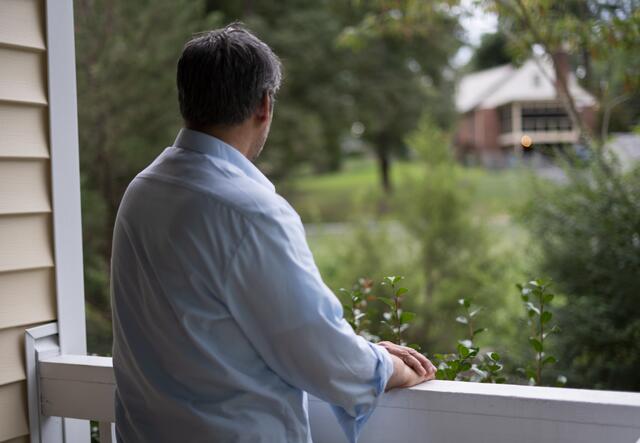
Abdul’s daughter, Fatima, 19
When I came here, the thing that surprised me was the people, their kindness and love. I was surprised to see their interest in refugees. I was thinking that going to a different country other than Afghanistan might be difficult for me, but when I came here, I did not have that feeling.
When I came here, the thing that surprised me was the people, their kindness and love.
I want to learn the language as soon as possible. I want to study journalism, build my future, help my father, and explore beautiful places in the U.S. I want to see the historical places and gain more information about the country because of the field of study which I will pursue.
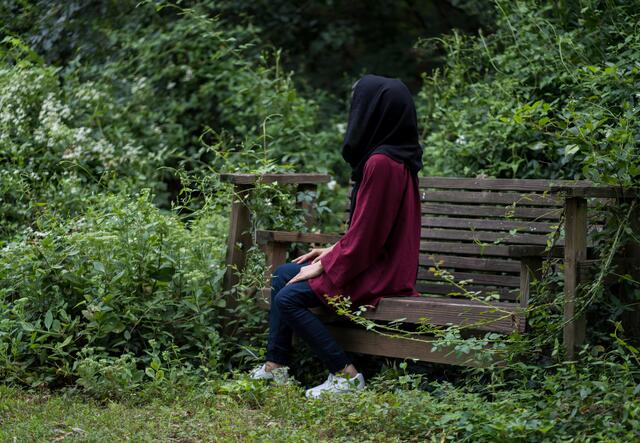
Sheima, 41
I am with my family—my two children and my husband. One son and one daughter are still in Afghanistan. Since my daughter is married, she was not eligible for our application. My son was not eligible either because he is 25 years old.
We were suddenly given a time for the flight; I did not have the choice of when to come here. I had plans to sell some of my things and pay the rent of the house where my son will be living after I leave Afghanistan. I was not able to do all this. We were all in a hurry.
I was happy because I was getting out of Afghanistan to go to a country where I can live and work peacefully.
I was happy because I was getting out of Afghanistan to go to a country where I can live and work peacefully. I was sad at the same time because I was leaving behind my children. I cannot say anything more about this. Whenever I remember, I become stressed.
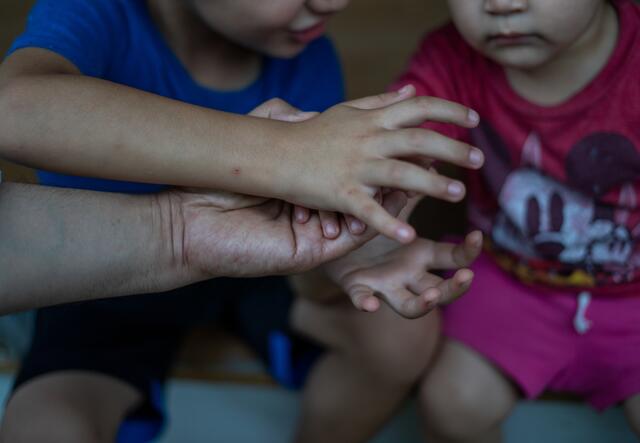
Sheima’s husband, Yasin, 54
We do not have any family here. We do not have friends who we can contact.
When we arrived in Richmond, we were brought to a hotel and we are still living here. The case worker took us all for food and we were given cards to buy our essentials. She will find a house for us soon.
The place where a person lives and the people around them ... that is their home and that is life.
I respect everyone’s thoughts and perspectives. But in fact, if we think about it, all human beings belong to one origin and the Earth is made of one soil. The place where a person lives and the people around them, the family, the community and the society—that is their home and that is life.
We will not be alive for so many years that we should argue over everything. With this short life, people should live prosperously and should respect each other. I think this is enough.
Sheima’s daughter, Zeba, 19
I want to be a doctor. I want to study curative medicine and I want to serve people. I just want to support my family even though I am not familiar with the society and surroundings.
I want to thank you for accepting us as refugees.
I want to thank you for accepting us as refugees. You have been a great help to us. And we will be needing more help so that we can make our life better. Those refugees who are stuck in Afghanistan, the U.S. should accept them, too.
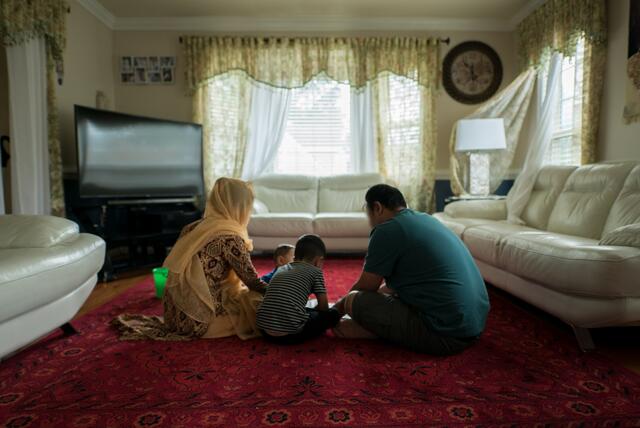
Ali, 34
I have my wife and my two children with me. I left Afghanistan with tears in my eyes. My sister is still there and I am very worried about her. She has no one to take care of her. She is living alone.
When my visa was issued from the U.S. embassy, I was not able to sell anything. I quickly bought my tickets, packed only three sets of clothes without any proper bags, and came to America. I was not able to tell my children that we were going to the U.S. since the children would tell their friends about it and everyone would find out about us. I was not even able to say good-bye to some of my close friends and relatives because the situation was terrible.
I want my children to have a brighter future.
The day I left Afghanistan, I contacted my friend in the U.S. to tell him that I am coming. He came to the airport to pick us up. He brought us to his home and we are still living there. Our place is small, but we are thankful to them that they have helped us so much.
I want my children to have a brighter future. I myself did not have the opportunity to continue my studies, but at least I want my children to finish their higher education. One of the reasons we came here was so my children could have a better future.
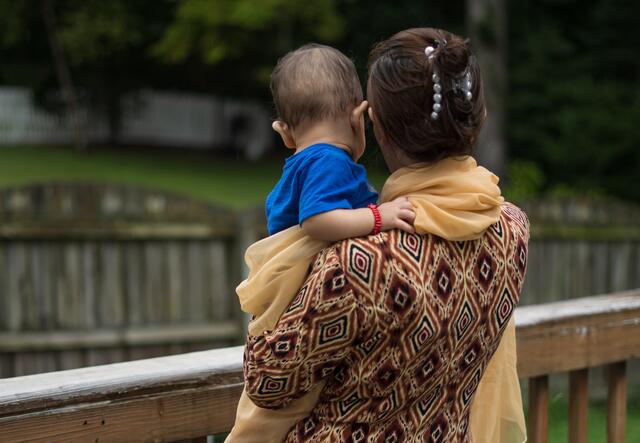
Ali’s wife, Hadiya, 27
My children were asking where we have come to and why we are here. Whose house is this? Where is our own house? My eldest son keeps asking why we do not go to our aunt’s or uncle’s home. Where are they?
We packed two sets of clothes per person. Even for my children I took only two sets of clothes. We did not inform anyone. When we arrived here, we called our friends and family members back home and we apologized that due to the horrible situation we were not able to get together and say good-bye to them all.
People we have been introduced to, and even strangers, have treated us well so far.
We do not have a car and we are not familiar with our surroundings here. The IRC has been very helpful. They usually come and check on us. When my son was ill, they took him to the hospital. They introduced us to people responsible for our medical and doctor’s appointments, accommodation and employment.
We were worried about whether people will accept us in our new country and how they will treat us. But people we have been introduced to, and even strangers, have treated us well so far.
*Names have been changed and faces have been obscured for the families' protection.
Get involved
Learn about ways you can welcome Afghans in your community.
Afghanistan crisis: Learn more
Crisis information: Afghanistan facts l What is happening in Afghanistan? l Crisis outlook
In focus: Women in Afghanistan l Hunger crisis l Climate change impacts l How Afghan allies seek safety l Afghan Special Immigrant Visa (SIV)How the IRC helps Afghans: In Afghanistan l In the U.S. l Around the globe
How to help Afghans: In Afghanistan l In your community l Donate to the IRC